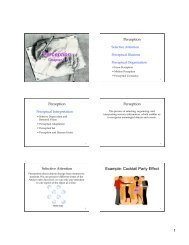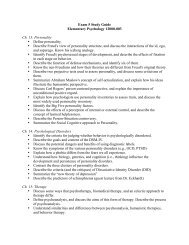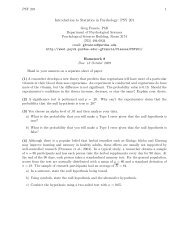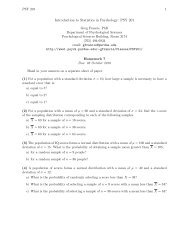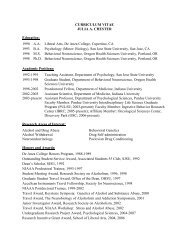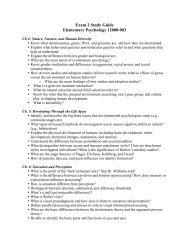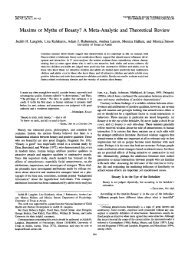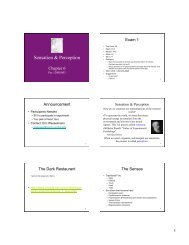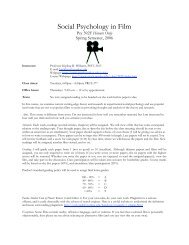Introduction to Cognitive Psychology - Department of Psychological ...
Introduction to Cognitive Psychology - Department of Psychological ...
Introduction to Cognitive Psychology - Department of Psychological ...
You also want an ePaper? Increase the reach of your titles
YUMPU automatically turns print PDFs into web optimized ePapers that Google loves.
Pr<strong>of</strong>. Greg Francis 8/14/12Levels <strong>of</strong> ProcessingLevel <strong>of</strong> processing is more important than intent <strong>to</strong>learn (Hyde & Jenkins, 1973)11 groups <strong>of</strong> subjects 1 control group: <strong>to</strong>ld they will be tested <strong>to</strong> recall the words» not given any study task 10 experimental groups split <strong>to</strong> perform a study task» Pleasant-unpleasant rating» Estimate frequency <strong>of</strong> word usage» E-G checking: does word contain an E or a G?» Identify part <strong>of</strong> speech: noun, verb,…» Sentence framing: which sentence does word best fit in? For all experimental groups, either» (a) Intentional learning : <strong>to</strong>ld they will be tested <strong>to</strong> recall thewords» (b) Incidental learning: not <strong>to</strong>ld they will be testedPurdue UniversityIntentionRecall (out <strong>of</strong> 24 words) varies a lot with taskNot much variation with intention <strong>to</strong> learnPurdue UniversityImplicationsJudgments <strong>of</strong> LearningPeople do not know the best way <strong>to</strong> remember! There was nothing s<strong>to</strong>pping controls from making pleasantunpleasantratings they apparently did not, or they would have done better!Advice: study interactively read notes rewrite notes rephrase notes teach someone elseMore generally, people are not usually good atestimating whether something will be rememberedPurdue University Nelson & Dunlosky (1991)Subjects study a pair <strong>of</strong> words (e.g., OCEAN – TREE)Estimate how likely they are <strong>to</strong> be able <strong>to</strong> rememberone word if shown the other (JOL). Given OCEAN, how likely <strong>to</strong> remember the associated itemlater? This is the subjects estimate <strong>of</strong> their ability <strong>to</strong> use LTMMake judgment either Immediately after studying the pair Delayed <strong>to</strong> later in the experimental trialsNote: students studying for an exam <strong>of</strong>ten use theimmediate approach for a JOL <strong>to</strong> decide if they need<strong>to</strong> continue studyingPurdue UniversityJudgments <strong>of</strong> LearningImmediate JOLs donot match memoryperformance (at theend <strong>of</strong> the experiment) Especially for highJOLsDelaying the JOLleads <strong>to</strong> fairly accurateJOLsAdvice: study, wait,estimate learningMethod <strong>of</strong> lociUsed by ancient Greeks <strong>to</strong> remember complicated speechesTo remember a list <strong>of</strong> words or key ideas visualize walking around an area with distinctive landmarks link the items <strong>to</strong> be remembered with landmarks by using bizarremental imagery <strong>to</strong> recall items in order, mentally walk through area (any ordered sequence will work -- e.g., a childrens rhyme)Memory piggybacks on the easy recallability <strong>of</strong> the bizarreimageryPurdue UniversityPurdue UniversityPSY 200: Intro. <strong>to</strong> <strong>Cognitive</strong> <strong>Psychology</strong> 2



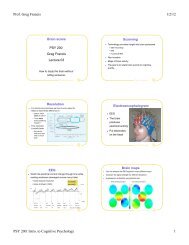

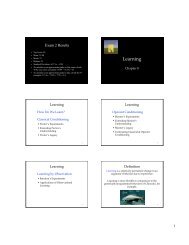
![Exam 4 Study Guide[1]](https://img.yumpu.com/45196739/1/190x245/exam-4-study-guide1.jpg?quality=85)
